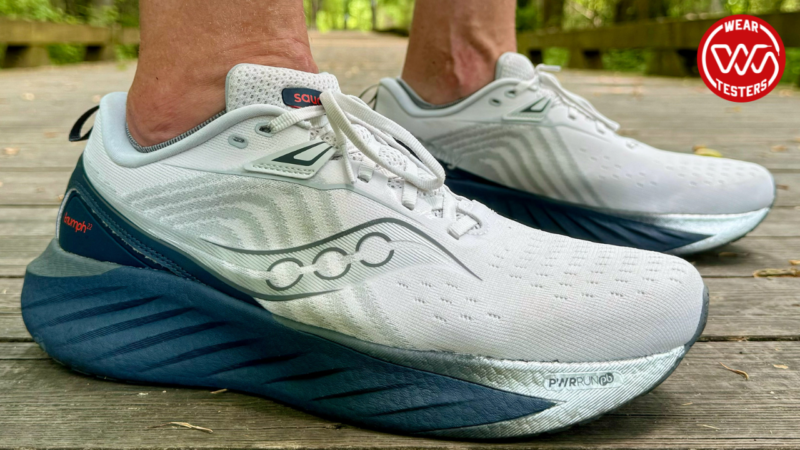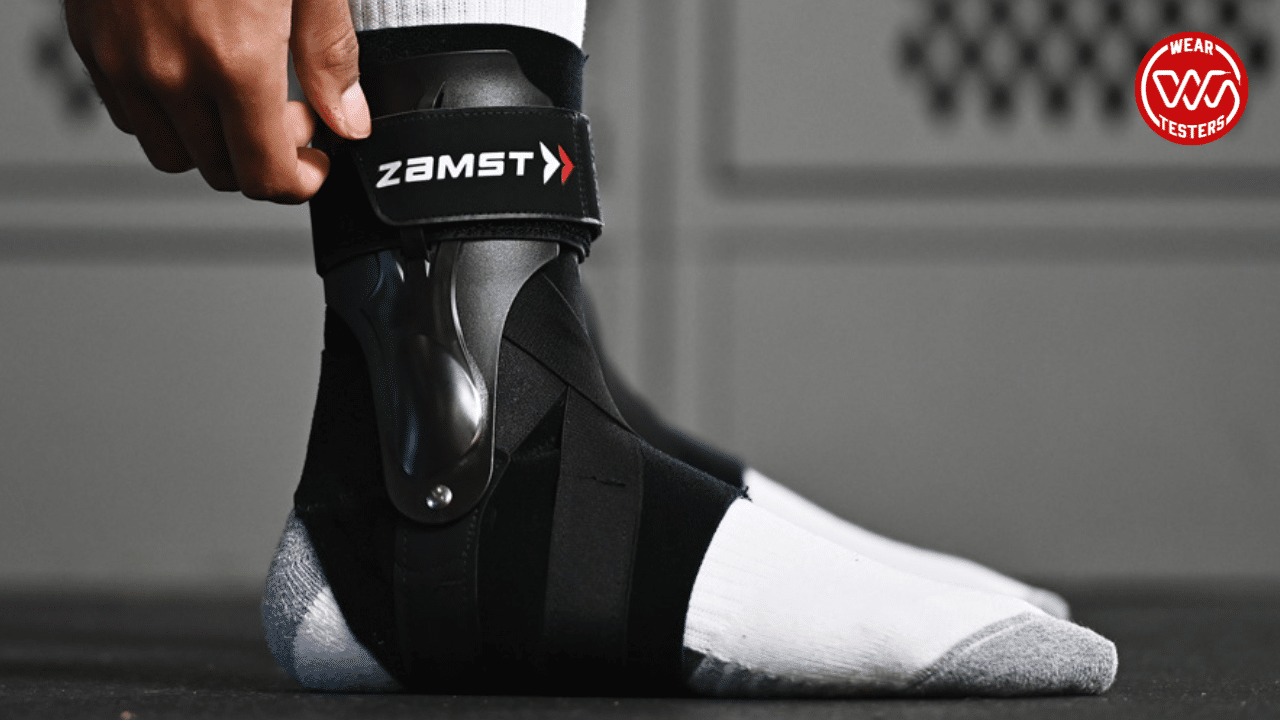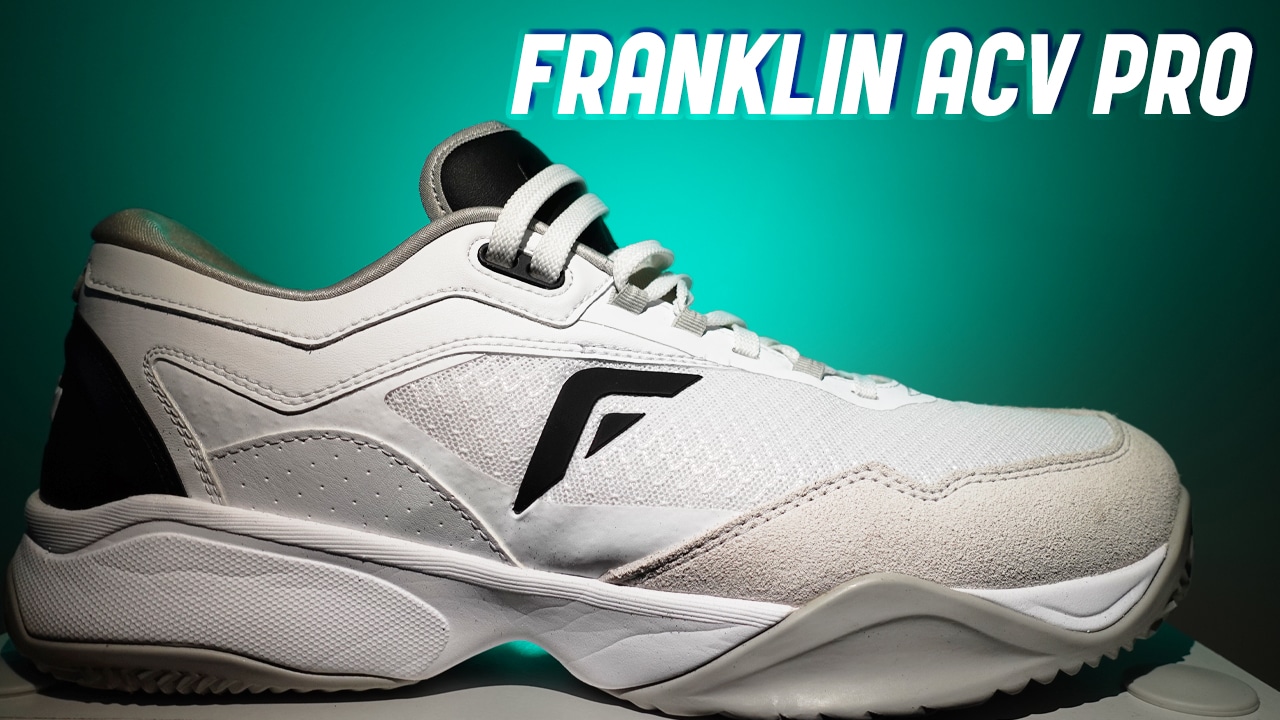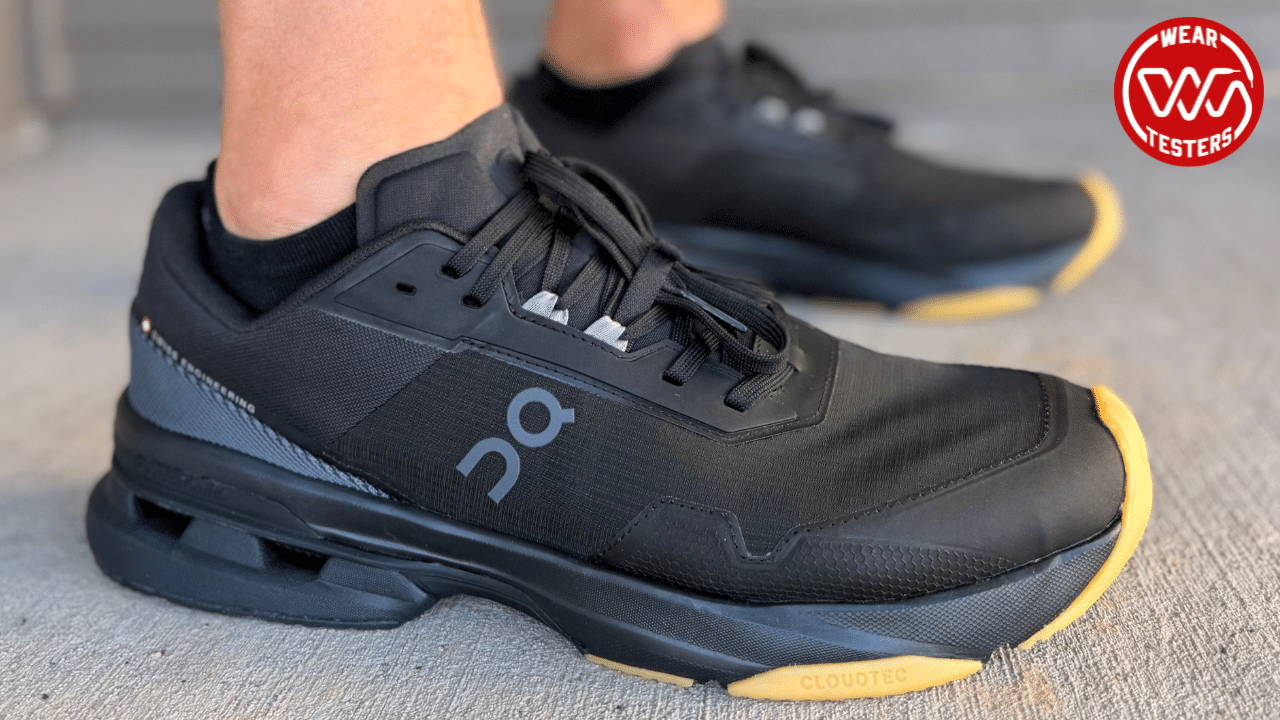Annie: Part of what I love about teaming up with Drew on running shoe reviews lies in how comically different we are (read: Drew is 6’6” and objectively fast; I am 5’0” and….optimistic). We haven’t conferred before combining our thoughts on the Saucony Triumph 22 in this review, so I’ll be very, very intrigued by where our opinions align and where they don’t. Because even after about 50 miles of testing, I still find the Triumph 22 to be a bit of a head scratcher.
The flashiest change to be found in the Saucony Triumph 22 when compared to the previous version is the new PWRRUN PB cushioning. It’s the same foam – at least in name – found in Saucony’s Endorphin Pro and Speed series. That certainly captured my attention, especially for a shoe priced as a premium daily trainer rather than a higher-priced super trainer (or an even higher-priced super shoe). But, let’s get down to business and see how this midsole upgrade played out in practice…
Saucony Triumph 22
Release Date: May 2024
Price: $160
Weight: Men’s 10.1 oz., Women’s 8.8 oz.
Drop: 10mm
Sizing: True to size
- Rundown: The Saucony Triumph 22 gets a midsole upgrade to the Peba-based PWRRUN PB. Despite that unquestioned upgrade, the shoe is a mixed bag.
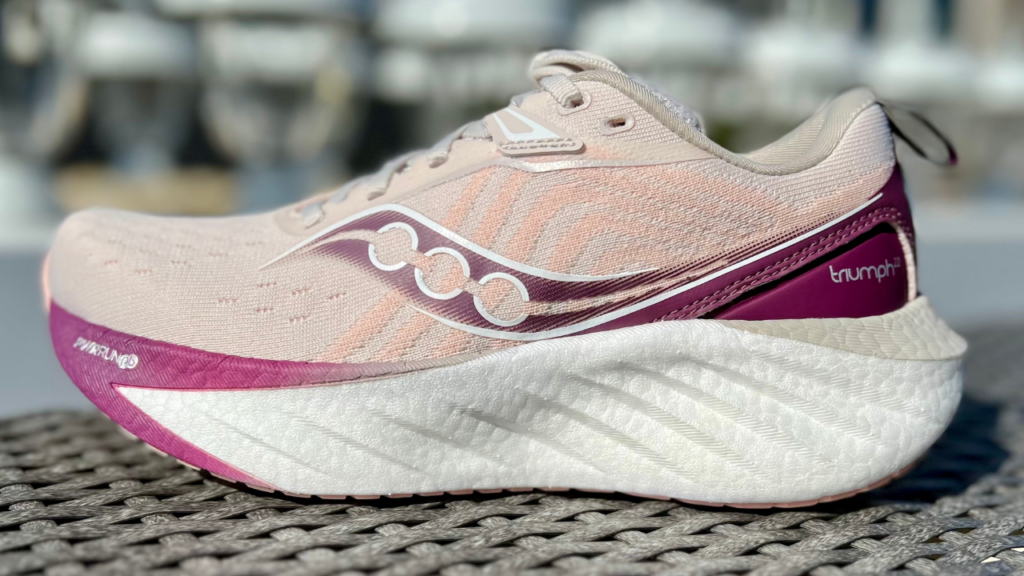
The Ride
Annie: For my part, the PWRRUN PB in the Saucony Triumph 22 provided plenty of resilient cushioning. But I didn’t get the squish and bounce I’d expect from a PEBA-based foam with super shoe (and super trainer) DNA. The formulation here feels much denser compared to how I’d characterize the PWRRUN PB in the Endorphin Speed 3, for example (Drew will be able to further compare to the Speed 4 and the Pro 4).
That’s at least in part due to the midsole formulation, as it would make sense that adjustments might need to be made to the foam itself with no plate available to help stabilize the platform. I didn’t mind the denser feel at all and especially enjoyed the forefoot, as it was still soft enough for me to displace the foam comfortably and reap its protective benefits.
What had a bigger influence on my experience, however, was the fact that I struggled with the ride geometry and what felt like overbearing support elements.
The stoutness of the foam on the rear half of the shoe sometimes made it difficult for me to clear the heel out of the way of my (mostly) midfoot strike, particularly at recovery/daily paces, which seems to be the overwhelming use case of the Saucony Triumph 22. And the sidewalls were more noticeable than I’d prefer as well.
I found myself craving either less foam under the rear half of the shoe or more foam under the forefoot – not for lack of cushion/protection but instead in order to better balance out the whole ride setup. As it was, I had a tough time getting into a truly effortless rhythm with this shoe.
The midsole shaping and the 10mm drop combined to make the shoe feel blocky to me at times, with a too controlling of a rearfoot. In fact, if Saucony listed the Triumph 22 in the stability category, I might believe it based on how prominent that supportive sensation was to me on the medial side in particular.
Interestingly, the geometry started to make more sense to my stride when picking things up closer to what would be my marathon pace; but then sustaining that pace was less viable and attractive than in comparably cushioned shoes that manage to be less bulky on foot.
Ultimately, I had a tough time keeping my natural cadence turning over and instead felt like the shoe wanted to pull me back toward the heel cushioning in order to make sense of the setup. The result was a kind of stilted braking effect where I had to overcome the shoe instead of the shoe working with my natural movement. And my body wasn’t too crazy about that redistribution of landing forces as the testing miles mounted.
But, endless combinations of factors make every runner’s stride unique, and lots of runners will benefit from how the Triumph 22 is put together. We’re lucky to live in a time when there’s something out there for everybody’s preferences and every body’s mechanics.
So, while the Saucony Triumph 22 wasn’t a great match for me, let’s find out how it suited Drew’s needs.
Drew: The big change to PWRRUN PB sounded really interesting on paper. But in practice, I didn’t really notice a big difference from the Triumph 20 and Triumph 21 versus the Triumph 22. This is not Endorphin level PWRRUN PB, not even close. It’s still soft upon step-in but denser and a lot less fun. However, the Triumph 22 complements the two Endorphin models nicely as if it’s the paired daily trainer. I feel like Saucony should have resurrected the Endorphin Shift brand name for this particular shoe.
Think of cushion implementation as a set of steps. It’s all PWRRUN PB in name but it goes good, better, best as you go from Saucony Triumph 22 to Endorphin Speed 4, to Endorphin Pro 4. I’d likely recommend anyone thinking of spending the $160 for the Triumph 22 spend the extra $10 and buy the $170 Endorphin Speed 4. It’s just a better value proposition.
In terms of the problems Annie had wrestling with the heel, I had similar but different issues with the Saucony Triumph 22’s back end. The 10mm drop felt even higher…maybe that’s because the heel feels slightly denser than the forefoot. In the course of my many miles running and prodigious amount of casual wear, the cushion never seemed to even out. The heel always felt oversized and got in the way of a perfect running experience.
This wasn’t the case on the Triumph 20 or 21, where despite the same 10mm drop, the heel didn’t feel disjointed or oversized versus the forefoot.
Currently, Saucony is a company in turmoil as its owner, Wolverine Worldwide shut down the Boston office and forced employees to move close to the company’s world headquarters in Rockford, Michigan. I have to think that chaotic environment affected the team’s ability to dial in the ride of the Triumph 22. The Triumph typically boasts its ride as one of its strongest positives and seeing that not happen here despite the foam upgrade is confounding.
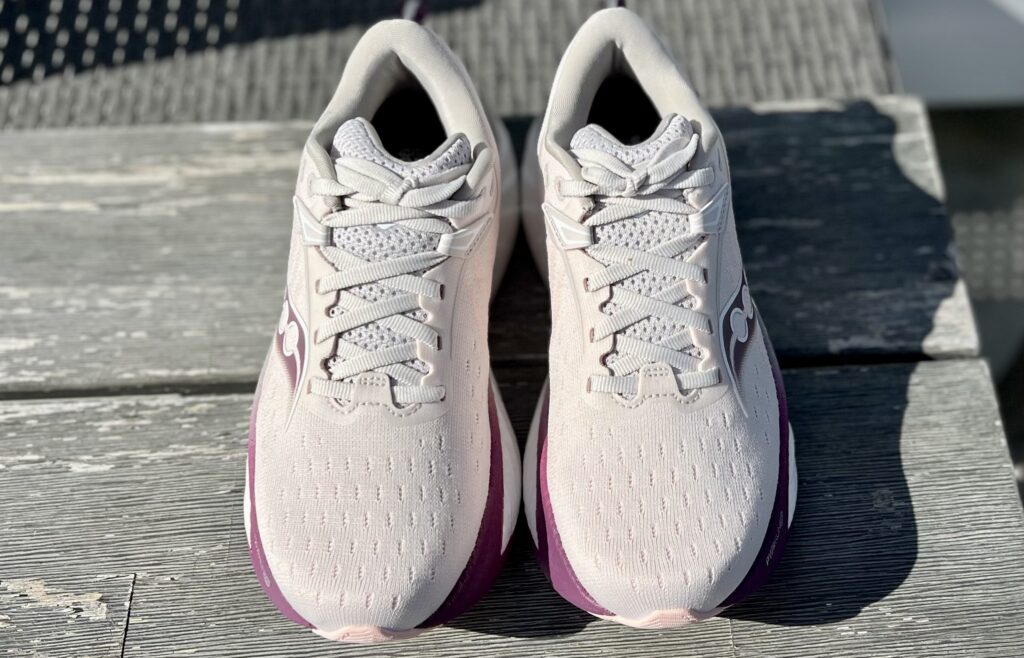
Upper
Annie: The upper is definitely made with comfort in mind, with an engineered mesh that feels borderline knit-like and lots of padding surrounding the foot at the tongue and heel collar. There are structural elements woven into the upper at the midfoot, and the tongue is gusseted on both sides. That all makes for lots of plushness, which is great in some ways. But it was warm when spring temperatures started to rise here in the midwest, even after a week or two to adjust to the change in weather.
There is also a sturdy heel counter with an additional overlay made of a leather-like vegan material. All that surrounding the heel combined with the sidewalls and medial sculpting on the rear half of the midsole again proved a bit too much structure for my taste.
What did you think, Drew?
Drew: The heel on my pair of Saucony Triumph 22 is a vinyl or TPU but I don’t think it contributes to the wonkiness of the heel. It’s a fairly standard heel counter.
The upper is plush and well-fitting with plenty of room. It’s similar to previous Triumphs in that there’s plenty of material used to create the extra padding (a move Saucony and Brooks often trot out in their daily running shoes aimed at the mass market). That material does make it a warmer shoe than I prefer for summer running but there’s some airflow so your mileage may vary (Editor’s Note: that lazy pun is now banned from running shoe reviews on this site).
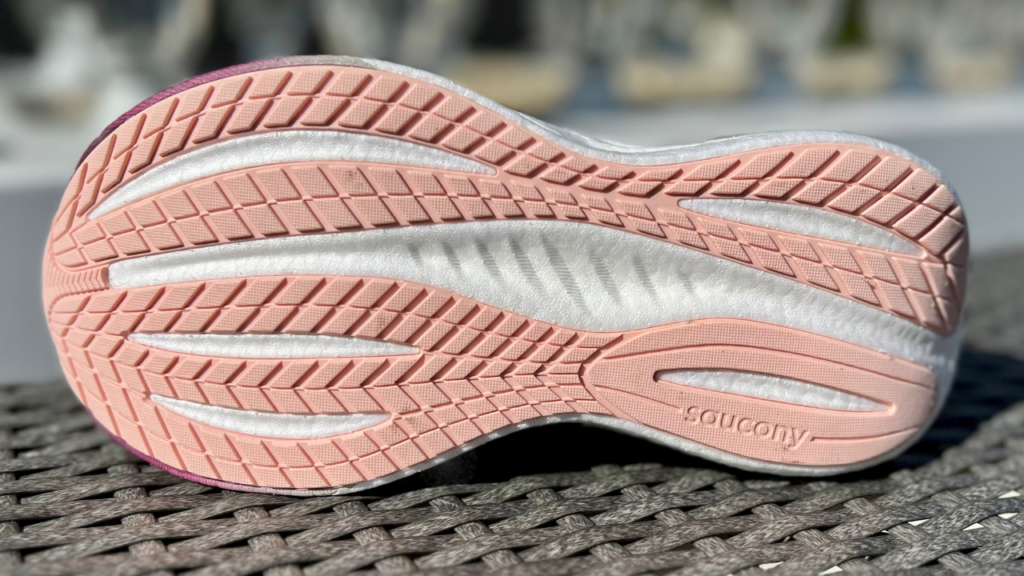
Outsole
Annie: The outsole has a healthy amount of rubber coverage made for long miles. I didn’t have any constant issues with traction in dry or soaking wet conditions. But I didn’t have quite as much confidence on mildly damp pavement. When that damp pavement was covered in the pollen and general detritus of spring and I attempted to push off during uphill strides, I experienced some rather shaky moments.
Drew: The outsole on the Saucony Triumph 22 will be plenty durable as it’s very similar to the hearty midsoles on the previous two models. Like Annie, I did experience some slippage in damp conditions so it’s solid but not in the upper echelon of outsole traction.
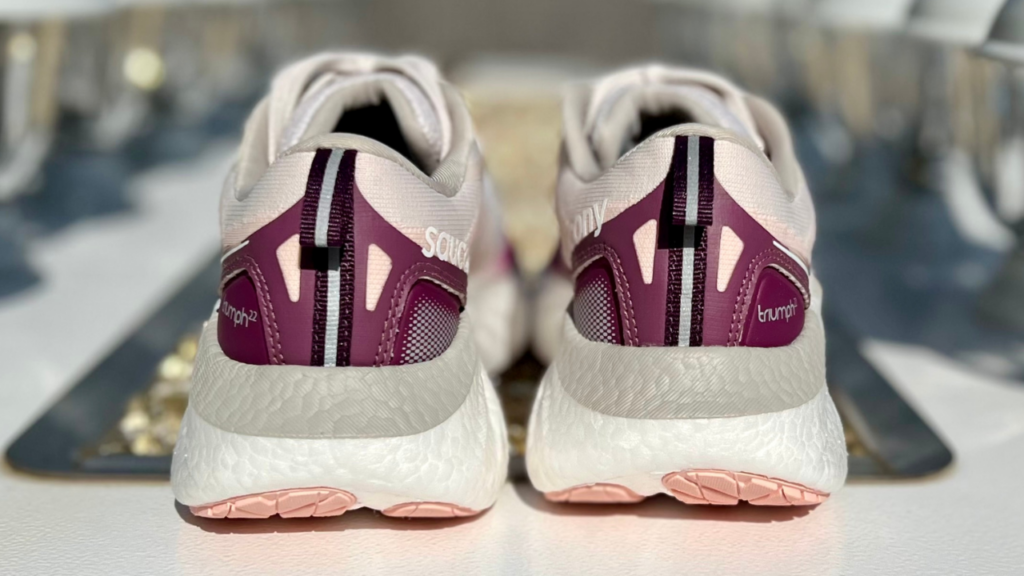
Pros
- Accommodating platform
- Resilient cushioning & overall durability
- Built for all-day, all-around casual comfort
- Plush upper that prioritizes comfort
Cons
- Clunky, large heel prevents a smooth ride
- Feels bulky in size on the run
- Upper not hot-weather friendly
- Lack of versatility
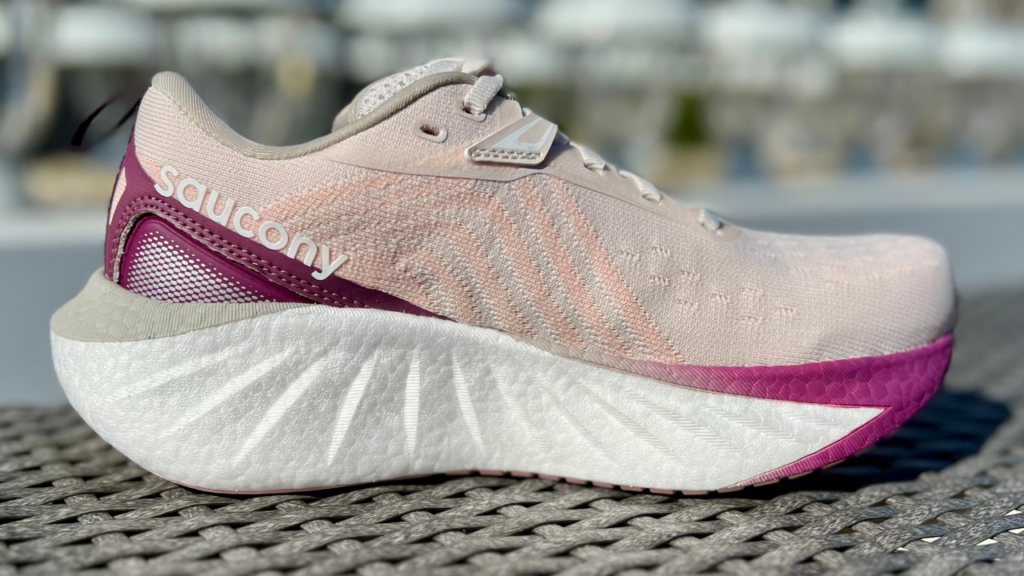
Is the Saucony Triumph 22 wide foot friendly?
Annie: I had a quirky experience with the fit. In fairness, the Saucony Triumph 22 had the unfortunate timing of following a string of Topo shoes (which I’ve been enjoying) in the testing queue. There are only a handful of companies that truly rival the anatomically shaped Topo forefoot. So I had to recalibrate my testing senses a bit when adjusting to early runs in the Triumph 22.
Even so, I did ultimately have to loosen the bottom lacing slightly to keep my pinky toes comfortable during efforts in the 2-hour+ range. Yet at the same time, it is quite a roomy shoe overall. I ended up going with a runner’s knot in order to dial in the midfoot and heel more securely (which helped to improve the forefoot comfort as well).
So, while I didn’t find the forefoot of the standard width cavernous, per se, it will be wide enough for other slightly-wide footers like myself. And there are wide versions available for those who need additional wiggle room.
The Saucony Triumph 22 also ran a touch long for me in my women’s 6.5, but the gentle slope on the lateral forefoot would make me hesitant to go down a half size (especially for a shoe that’s meant to cover longer efforts).
So, all in all, my foot might just not be an ideal match for the shape of the last Saucony used in this case. I had a little too much length, not quite enough roundness in the forefoot shape, but a little too much room in the midfoot, etc. Point being, if you’re not already well-acquainted with how Saucony shoes typically fit your particular feet, trying on a couple of sizes might be the best bet here to set yourself up for success.
Drew: The Saucony Triumph 22 has a slight bit of extra length but it’s no cause for concern or a reason to change from your typical running shoe size. The shoe’s build is accommodating but it’s not quite as wide as possible around the ball of the foot. Some wide footers may experience discomfort there and because of that narrowness I’d recommend most wide footers try on the Saucony Triumph 22 before buying.
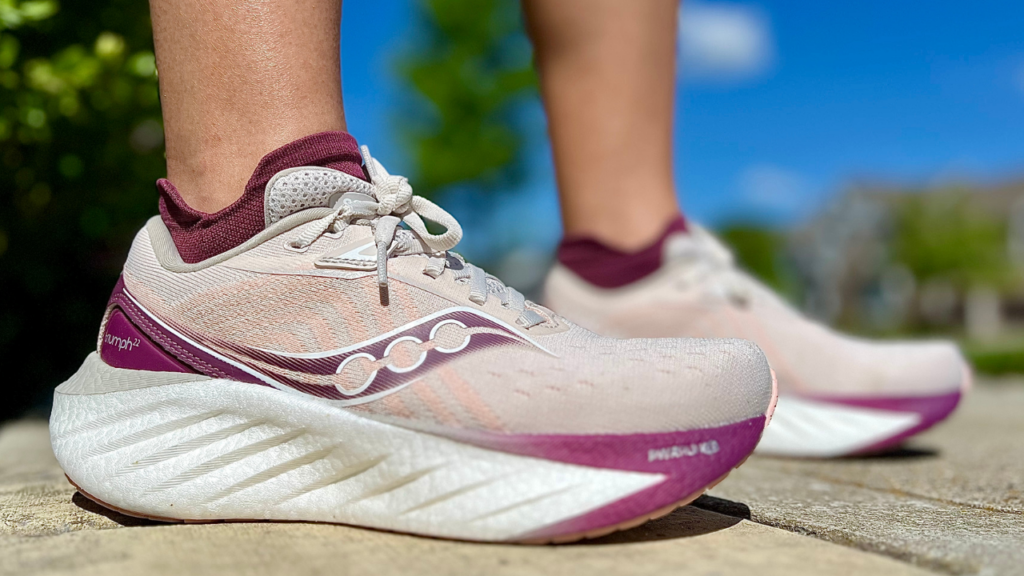
Is the Saucony Triumph 22 worth $160?
Annie: The Saucony Triumph 22 is built like a tank and I have to imagine that will make for long-lasting durability. So if you enjoy the ride geometry and supportive feel, you will get lots of well-protected miles in the Saucony Triumph 22. That combined with generally more expensive PEBA foam do make the $160 price tag appropriate from a category perspective.
But I just never found that intangible joy factor here and think the PEBA upgrade is a tiny bit wasted in execution. So, if your expectation of value is more related to fun and versatility, the weight and overall substantial feel of the Triumph 22 might not be your top choice. This really is a “value is in the eye of the beholder” kind of shoe for me.
Drew: Annie said it, the price is right in theory, but not in reality. The Saucony Triumph 22 just doesn’t deliver enough performance value to really feel like a $160 shoe even though on paper it has all the attributes.
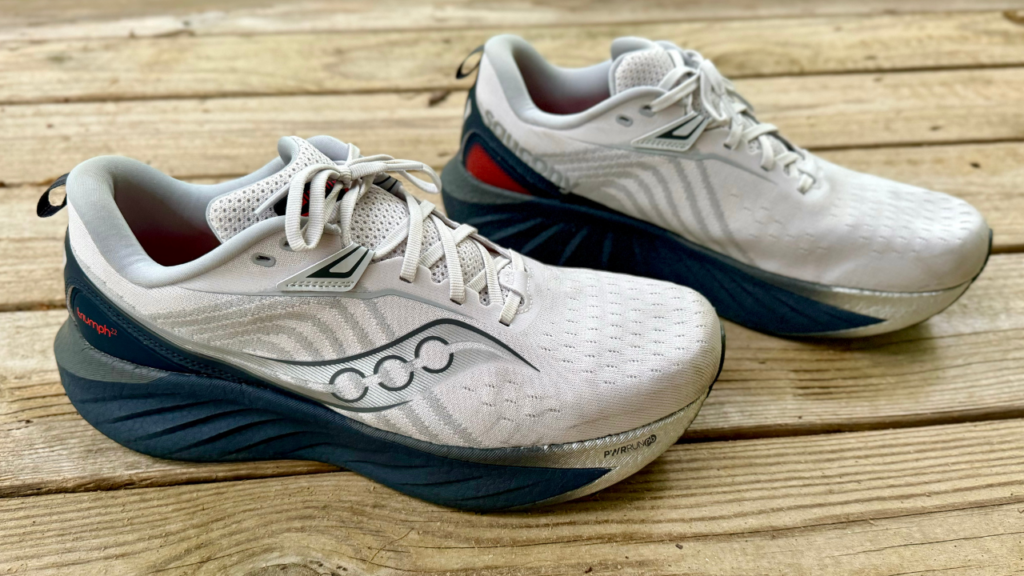
Saucony Triumph 22 Summary
Annie: The Saucony Triumph 22 is a sturdy, supportive trainer with dense, but protective cushioning meant for plenty of long, cruising miles. Depending on the runner, its beefy construction and substantial rearfoot could prove to be either a boon or a bane.
Drew: The idea of the Saucony Triumph 22 with its upgraded midsole is great. But…it just ends up being a solidly meh shoe due to issues sprinkled throughout its overall performance.
I’m betting long time Triumph fans will still enjoy it, but they won’t love it like as much as previous Triumph iterations. It’s just not quite the same smooth riding, reliable shoe they’ve grown accustomed to.
How does the Author Run?
Drew Whitcomb (age 42, 6’6″ 195lbs): Runs daily with a once a week rest day. Runs a lot of miles due to testing needs and a growing affinity for long-distance races. Regularly competes in marathons, half-marathons, 10k, and 5k races.
Annie Keris (age 39, 5’0” 117lbs): Typically follows a “two days on, one day off” running routine. “On” days include daily miles, speed work, and long runs. An “off” day usually involves yoga and mobility/recovery work. Enjoys occasional racing but perhaps enjoys the training process even more. Gravitates most toward the half marathon distance, but ventures into the 10k and 5k as well. The marathon is thus far uncharted territory…
Disclosure
While Saucony did send a pair of the Saucony Triumph 22 to facilitate this review, the company had no involvement in this review, didn’t receive an advance look at it, and have not attempted to influence it.

